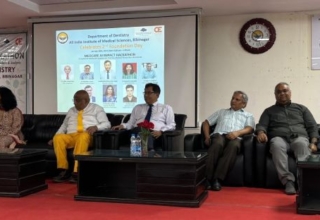
With exams are around the corner, stress seems to be a common and all-pervasive phenomenon affecting many households, and is being widely spoken about everywhere. Simple techniques and advices how to stay calm during exams are also coming uninvited. Therefore, it is the responsibility of the parents to maintain a sense of calm by encouraging a proportionality of recreational activities with exam prep while also ensuring there is no anxiety transferred from the parents to the child writes Devyani Mungali, founder Sanskriti Group of Schools, Pune
Some exam stress is always good as it helps in stimulation of brain system and prepares the student to get in a work mode. It is thinking too much of it or bringing more of it through worry and anxiety that makes it really bad. Remember, it’s normal to feel stressed during exams, but some techniques listed below can help you manage stress and perform at your best. Find what works best for you and incorporate these strategies into your exam preparation routine.
Here are these simple techniques to help you stay calm:
- Deep Breathing:
- Take slow, deep breaths to calm your nervous system.
- Inhale deeply through your nose, hold for a few seconds, and exhale slowly through your mouth.
- Repeat this several times to reduce anxiety.
- Progressive Muscle Relaxation (PMR):
- Tense and then relax each muscle group in your body, starting from your toes and working your way up to your head.
- This can help release physical tension and promote a sense of relaxation.
- Mindfulness Meditation:
- Practice mindfulness to stay present and focused.
- Pay attention to your breath, sensations, or surroundings without judgment.
- Mindfulness can reduce anxiety and improve concentration.
- Breaks and Physical Activity:
- Take short breaks during study sessions to prevent burnout.
- Engage in physical activities like a short walk, stretching, or light exercise to boost your mood and energy levels.
- Positive Visualization:
- Picture yourself succeeding in the exam and imagine the sense of accomplishment.
- Visualizing positive outcomes can help reduce anxiety and increase confidence.
- Organize and Plan:
- Create a study schedule to manage your time effectively.
- Break down your study material into smaller, manageable tasks.
- Having a plan can reduce feelings of being overwhelmed.
- Stay Hydrated and Eat Well:
- Maintain a healthy diet and stay hydrated.
- Avoid excessive caffeine or sugary foods, as they can lead to energy crashes and increased anxiety.
- Sleep Well:
- Ensure you get enough sleep before the exam.
- Lack of sleep can impair cognitive function and increase stress levels.
- Positive Affirmations:
- Repeat positive affirmations to boost your confidence.
- Remind yourself of your capabilities and focus on your strengths.
- Practice Past Papers:
- Familiarize yourself with the exam format by practicing past papers.
- This can help reduce anxiety by making the exam setting more familiar.
- Connect with Others:
- Share your concerns with friends, family, or a mentor.
- Talking about your worries can provide emotional support and perspective.
- Limit Distractions:
- Create a quiet and comfortable study environment.
- Minimize distractions such as noise, social media, and other interruptions.
There are also multiple breathing techniques which can help the child calm his/her nerves by activating the Para-sympathetic nervous system. It is generally a good practice to encourage children to pursue any hobby or means of recreation such as sports, music, learning an instrument, etc. through exams as well. This allows a sense of proportionality to the children resulting in them viewing exams as just a milestone or step in the longer journey of life. In all of this, the role of a teacher also becomes extremely crucial, in addition to parents. Children need to be reminded that it is not the outcome as much as the efforts that are the most important.










